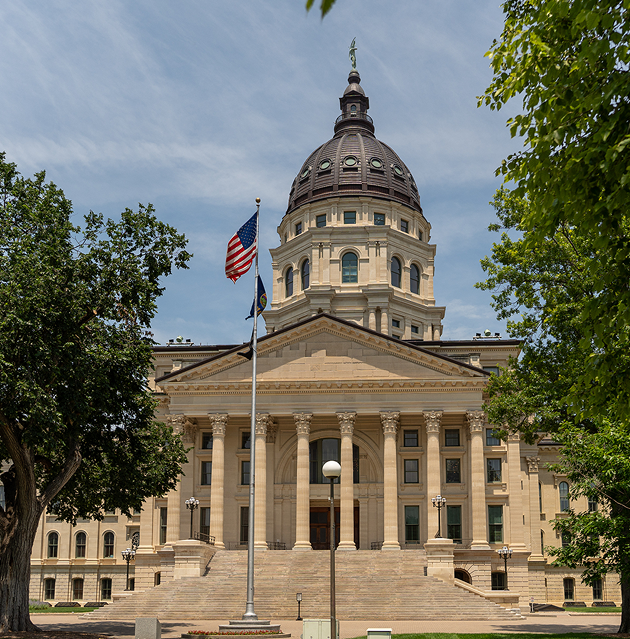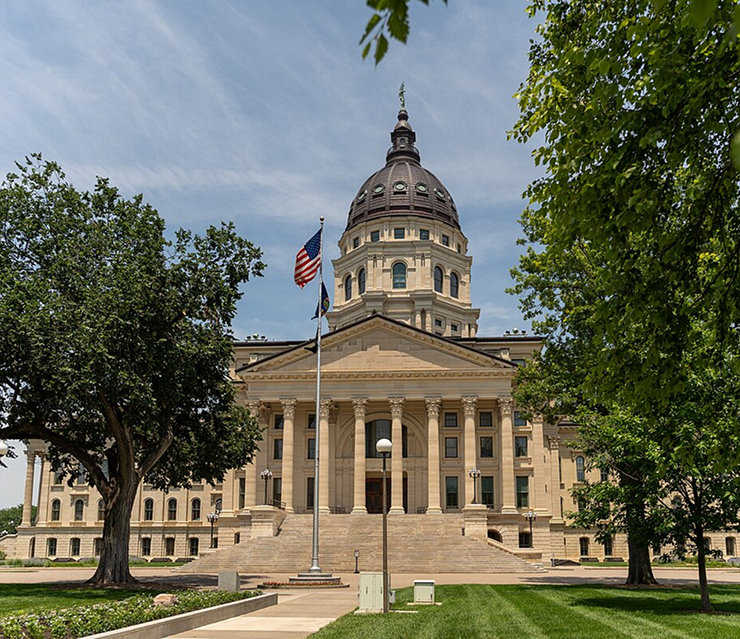While most states exempt groceries from sales tax, Kansas applies sales tax to food purchases, though recent changes have reduced the rate and will phase it down further in the coming years. For businesses and retailers, understanding the Kansas grocery tax rules is essential to ensure compliance and accurate pricing at checkout. Let’s find out everything about it in this sales tax guide.
Does Kansas tax groceries?
Kansas imposes sales tax on most food and grocery items, but certain staple foods are exempt or taxed at a reduced rate under state law. This partial taxation creates complexity for both consumers and retailers.
For businesses, knowing how grocery tax rules apply is essential. Retailers must correctly categorize items like bread, milk, or prepared foods, and apply the right tax rate to avoid errors at checkout. Misclassifying products can lead to penalties, audits, or customer dissatisfaction, making compliance a top priority for Kansas grocery sellers.
Overview of Sales Tax in Kansas
Kansas has a base state sales tax rate of 6.5%, with local jurisdictions adding their own rates. As of January 1, 2025, grocery tax in Kansas was eliminated on groceries and food ingredients, reducing the rate from 2% in 2024. However, local sales taxes on food remain in effect, ranging from 0% to 5%, depending on the city or county. This means the total sales tax rate on food can vary between 6.5% and 11.5%.
Sales tax in Kansas is applied using a destination-based model, meaning the applicable tax rate is determined by the location where the buyer takes possession of the goods or services. This structure, known as the Streamlined Sales Tax system, results in different sales tax rates across the state.
For businesses curious about tax distinctions, see also VAT vs Sales Tax for a global perspective.
Grocery Tax Rules in Kansas
Kansas has eliminated the state sales tax on food and food ingredients, effective January 1, 2025. This marks the final phase of a gradual reduction that began in 2023. However, local sales taxes imposed by cities and counties remain in effect, meaning grocery bills may still include tax depending on the location of the purchase.
- Staple Groceries: Items like milk, bread, fruits, and vegetables are considered “food and food ingredients” and are exempt from the state sales tax. Local taxes may still apply, varying by jurisdiction. Learn how to manage exemptions with a Sales Tax Exemption Certificate.
- Prepared Foods: Ready-to-eat items, such as hot takeout meals, restaurant dining, and deli sandwiches, are fully taxable at both the state and local sales tax rates. This distinction separates basic groceries from convenience or restaurant-style offerings.
- Soft Drinks and Candy: Packaged items like candy bars and soda are treated as groceries and exempt from the state portion of the tax. However, local sales taxes still apply, so the final rate varies by jurisdiction.
- SNAP and WIC Purchases: Items bought with Supplemental Nutrition Assistance Program (SNAP) or Women, Infants, and Children (WIC) benefits are exempt from both state and local sales taxes in Kansas.
Tax on Food and Beverages in Kansas
While Kansas has fully eliminated the state sales tax on most grocery items, local jurisdictions retain the authority to impose their own sales taxes on groceries. This means that while the state portion is now zero, shoppers may still encounter tax on food in Kansas depending on their location.
For instance, when understanding food and beverage tax in Kansas, know that prepared foods, including meals served in restaurants, remain subject to the full state and local sales tax rates. This includes items such as hot takeout meals, deli sandwiches, and other ready-to-eat foods.
For more on why compliance matters, check out Why Sales Tax is Important.
Businesses can simplify compliance by understanding sales tax compliance.
Local Jurisdiction Variations in Kansas
The total tax rate on groceries can vary significantly depending on the city or county. Retailers must stay informed about these local differences to remain compliant and avoid penalties.
| City/County | Local Grocery Tax Rate |
| Roeland Park | 1.50% |
| Kansas City | 0% |
| Johnson County | 0.125% |
Retailers should monitor local tax rates to remain compliant and avoid penalties. For multi-location businesses, physical nexus and economic nexus rules may also determine where local taxes apply.
Additionally, some states do not accept out-of-state resale certificates, so check documentation requirements.
Examples: How Grocery Tax Applies in Kansas
To understand how Kansas food tax works in practice, here are some everyday examples in Kansas:
- Bag of Apples
- Category: Staple grocery item
- Tax Treatment: Exempt from state sales tax; local taxes may apply depending on the city/county.
- Example: Buying apples in Wichita may incur a 1% local grocery tax.
- Packaged Candy (e.g., chocolate bar)
- Category: Grocery snack item
- Tax Treatment: Exempt from the state sales tax; subject to applicable local taxes.
- Example: Candy purchased in Topeka may be taxed at the local rate if the municipality imposes one.
- Restaurant Meal (e.g., lunch at a diner)
- Category: Prepared food
- Tax Treatment: Fully taxable at both state and local rates. In Kansas, the state portion is currently 0% on groceries, but prepared foods remain taxable at the standard 6.5% state rate plus any local taxes.
- Example: Ordering a hot meal in Kansas City may include a combined tax rate around 9–10%, depending on local levies.
- Coffee Beans vs. Brewed Coffee
- Coffee Beans (for home brewing): Treated as a grocery item, state tax-exempt; local taxes may apply.
- Brewed Coffee (from a café): Considered prepared food, fully taxable at both state and local rates.
Compliance Challenges for Businesses in Kansas
Even though Kansas has eliminated the state sales tax on groceries, retailers still face several compliance challenges due to local taxes and the complexity of distinguishing between grocery items and prepared foods.
- Confusing Definitions of “Prepared Food”: Retailers must correctly classify items as grocery staples or prepared foods. For example, packaged cold cuts may be tax-exempt, but a freshly made deli sandwich is taxable. Misclassification can result in incorrect tax collection.
- Managing Multi-Location Stores with Varying Local Rules: Local sales taxes differ across counties and cities. A chain with stores in Wichita, Topeka, and Kansas City must apply the correct local grocery tax rate at each location, requiring careful POS system management.
- Accurate Reporting to the Kansas Department of Revenue: Businesses must file precise tax reports, tracking both exempt and taxable sales. Failure to report correctly can trigger audits, fines, and penalties.
- Risks of Noncompliance: Errors in applying local taxes or misclassifying items can lead to financial penalties, time-consuming audits, and reputational damage if customers feel they were overcharged.
Furthermore, businesses must be aware of the sales tax audit and statute of limitations to prevent unexpected liabilities.
How Commenda Helps with Kansas Grocery Tax Compliance
Keeping up with sales tax on groceries in Kansas can be complex, especially with varying local taxes and distinctions between staple groceries and prepared foods. Commenda, a sales tax platform, simplifies this process for retailers:
- Automated Grocery/Food Tax Calculations: Commenda automatically determines which items are taxable and applies the correct state and local rates, reducing human error at checkout.
- Real-Time Rule Updates: Whenever Kansas or local jurisdictions update tax laws, Commenda updates automatically, ensuring your business stays compliant.
- Simplified Filings: The platform streamlines sales tax filings, including state, local, and even VAT/GST requirements, saving time and administrative effort.
- Reduced Compliance Risk: By automating calculations and filings, Commenda minimizes audit risks, penalties, and reputational harm.
Commenda ensures your grocery tax compliance in Kansas is accurate and effortless. Whether you want to obtain a sales tax permit or streamline your sales tax management, book a demo today.
FAQs on Grocery Tax in Kansas
1. Are groceries taxed in Kansas?
Most staple groceries, such as milk, bread, fruits, and vegetables, are exempt from state sales tax as of 2025. However, local taxes may still apply depending on the city or county.
2. Is there sales tax on prepared food in Kansas?
Yes. Ready-to-eat items like restaurant meals, deli sandwiches, and hot takeout foods are fully taxable at both state and local rates.
3. Are soft drinks and candy taxed?
Soft drinks are fully taxable at both state and local levels. Candy and snack foods are exempt from the state portion, but local taxes may still apply.
4. Are groceries purchased with SNAP/WIC taxed?
No. Purchases made with SNAP or WIC benefits are exempt from both state and local sales taxes in Kansas.
5. Do restaurants charge sales tax in Kansas?
Yes. All prepared meals sold by restaurants are subject to the full combined state and local sales tax rates.
6. How often do grocery tax laws change?
State rules are fairly stable, but local taxes may change due to voter-approved measures or county-level adjustments. Retailers should check regularly for updates.
7. How can businesses automate compliance?
Businesses can use sales tax automation software to categorize grocery versus prepared food correctly, apply local rates, and streamline reporting to the Kansas Department of Revenue.
8. Does Commenda’s software handle multi-state grocery tax?
Yes. Commenda’s Sales Tax Software manages compliance across multiple states, automatically adjusting for state and local tax rules, including grocery, prepared food, and beverage categories.









